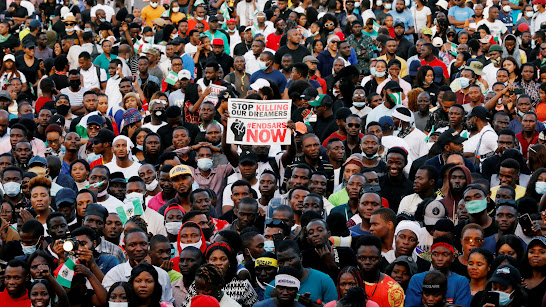By Ayo Oyoze Baje
No money, no food, no fuel, no electric power supply, no justice, no equity, yet all our politicians are concerned about now is how to grab and retain power through the forthcoming general elections! Nigerians now queue for fuel, queue for their own money and queue for PVC in our fatherland!
Worse still, the current currency redesign has drastically reduced the much-needed cash flow, putting millions of Nigerians in the pit of acute hunger and desperation. Did you watch the video of the lady who stripped herself half-naked inside a banking hall to express her outrage at their services, that went viral on social media? It is despicable. Imagine the sad situation that you cannot withdraw your own money, old or new currency from the bank or the ATM ”. He responded.
Indeed, that brought to mind the timeless song, ‘Suffering and
Smiling’ as released by the late Afro-beat music icon, Fela Anikulapo Kuti. If
the situation was as terrible as painted in the hit song back in 1978 and
Nigerians are still battling with similar challenges 45 years on, something
must be wrong with the type of democracy we operate; the type of leaders we
have had, and still have, as well as the mindset of Nigerians, in the face of
harrowing hunger and preventable poverty.
According to the World Bank Report: “As of April 2021, the
inflation rate was the highest in four years. Food prices accounted for over 60
per cent of the total increase in inflation. Nigeria’s economic growth is being
hindered by food inflation, heightened insecurity, unemployment and stalled
reforms”. Such warning inspired yours truly’s opinion essay titled: ‘Mister
President, there is hunger in the land!’ on May19, 2022.
But over a month into the new year, 2023 the situation has worsened. Despite the forecast by Focus Economics Consensus Forecast panelists expecting inflation to average 18.5% in 2023 it has already galloped to 21.23%. Not left out is that of the ever soaring food inflation.
For instance, while a 50kg of rice moved fromN7,000 in 2015 to N25,000 in
2022, it currently sells for N36,000.A basket of tomato that cost between
N2,000 to N3,000 back in 2015 now sells for N28,000.
Similarly,
a tuber of yam that sold forN500 back then now goes forN1,500. A bag of garri
that cost N400 sells for N1,100. A bottle of vegetable oil that used to sell
for N400 then now goes forN1,000. A bag of pure water that sold for
N80 now goes for N250.
All these are in one way or the other traceable to the huge jump
in the cost of premium motor spirit that sold at N87 per litre in 2015 but with
the hardship costs between N270 to N350 per litre, depending on which part of
the country you are buying it from. The exchange rate of the Naira has
since risen from N128 to a Dollar to some N680 to N700, depending also on the
source one is getting it from either the bank or the black market. Perhaps,
from the ubiquitous Aboki-currency changer.
As reflected in 2022, whether the president likes to hear this or
not, the bitter truth is that we are currently confronted not only with hunger
but the critical issues of extreme poverty and food/ nutrition insecurity. As
at November, 2022 the National Bureau of Statistics (NBS) stated that63% of
persons living within Nigeria (133
The National MPI is 0.257, indicating that poor people in Nigeria
experience just over one-quarter of all possible deprivations. 65% of the poor
(86 million people) live in the North, while 35% (nearly 47 million) live in
the South.
The other significant issue is that of bridging the rich-poor gap
that has worsened over the years. The Nigerian Living Standards Survey (NLSS)
is the official survey that is the basis for measuring poverty and living
standards in the country and is used to estimate a wide range of socio-economic
indicators including benchmarking of the Sustainable Development Goals.
According
to Oxfam’s calculations, lifting all Nigerian people living below the extreme
poverty line of $1.90 out of poverty for one year will cost about $24 billion.
This amount of money is just lower than the total wealth owned overall by the
five richest Nigerians in 2016, which was equal to $29.9 billion.
So, what is the best way out of the current sorry situation? In all honestly,
this is the right time to redesign the type of democracy we run. We have to go
back to identify and learn from history, as it happened in Athens, in ancient
Greece, back in 510 B.C.
The pendulum has to swing from the equivalents of the tyrant,
Hippias who was expelled from the city, ending fifty years of oppression that
began with his father, Pisistratus. We need our own Cleisthenes, who earned the
title “Father of Democracy” for his radical reforms to the Athenian government,
which later Athenians saw as the beginning of their democracy.
Nigerians must come to the bitter truth that power belongs to them
and not their self-serving, overtly greedy and power-poaching politicians
latching on the structure of high cost of getting into power and huge pay
packages of elected and appointed politicians, that has widened the gap between
the very few rich and the millions of poor citizens.
Apart from a holistic restructuring of the polity, for the states
to control their resources, we have to do away with the Allocation and Fiscal
Commission (RMAFC) that approves the huge pay package of political
appointees.
Instead, we need Volunteers in Government, made up of people with vision, who
are ready to sacrifice their energy, time and resources to rebuild the
nation-state. They should be placed on equivalent civil salary scale in tandem
with the tough economic situation as at this day.
The time for self-deception has come and gone for good!
*Baje is a public affairs analyst


No comments:
Post a Comment